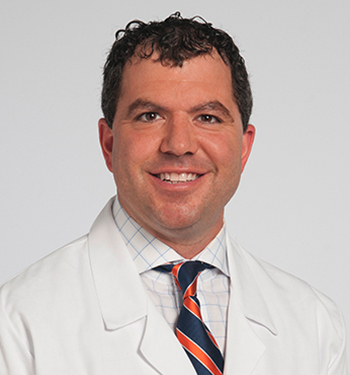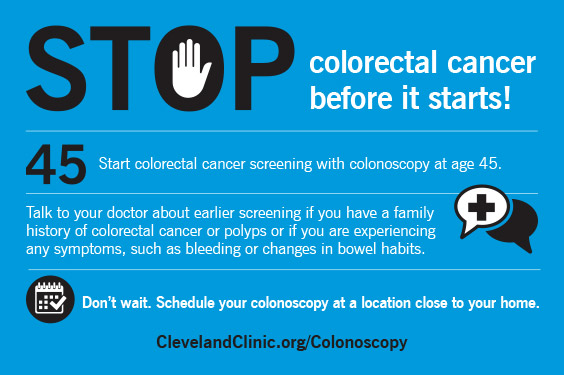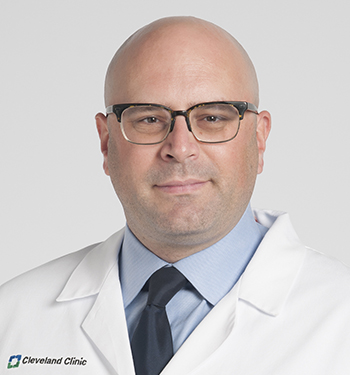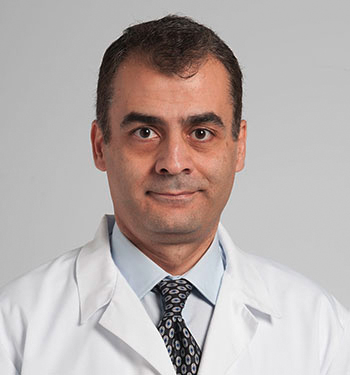Colorectal cancer: A colonoscopy can save your life.
Colorectal cancer. It can be an uncomfortable topic to talk about. Of cancers that affect both men and women, colorectal cancer is the second leading cause of cancer deaths in the United States. Despite this statistic, it doesn’t have to be — colorectal cancer is very treatable if caught early.
Colorectal cancer starts from little growths called polyps that develop on the lining of the colon or rectum. A colonoscopy, if done early, is the only screening that can prevent this type of cancer.
Everyone is at risk because everyone has a colon. New as of 2021: It is recommended that adults have their first colonoscopy at age 45, because the majority of colorectal polyps occur after this age. “Those affected with symptoms such as pain, bleeding or a change in bowels should begin having colonoscopies earlier. The same goes for those who have a family history of colon cancer,” advises Dr. Champagne. “Your physician will let you know when you should have your first screening.”
“For certain people, diet and exercise just aren’t enough. Some require surgery to achieve their weight-loss goals,” says Jesse Gutnick, MD, a bariatric surgeon at Cleveland Clinic Fairview Hospital and Cleveland Clinic Richard E. Jacobs Health Center at Richard E. Jacobs Campus in Avon. “Your body is like a thermostat — and bariatric surgery is like adjusting the temperature to lose weight.”
If you're significantly overweight — obese or morbidly obese — and want to make a lifestyle change, you may be a candidate for bariatric surgery at Cleveland Clinic.
- 40 or higher.
- 35 — and diabetes, high blood pressure, high cholesterol, fatty liver disease or sleep apnea.
- Between 30 and 35 — and uncontrolled diabetes.
More than just weight loss surgery.
If you are overweight, bariatric surgery is a powerful tool that can change your life for the better and provide sustained relief. Benefits of bariatric surgery go beyond just weight loss.
“I often ask patients why they want to lose weight. The most common answer is that they want to be healthier,” says Dr. Gutnick.
Bariatric surgery aids in treating health issues, such as:
- Type 2 diabetes.
- Cardiovascular disease.
- Depression.
- Sleep apnea.
- Joint pain.
- Fertility problems.
“One key factor in success is patient interest. In order to do well after surgery, patients need to be motivated and want to lose the weight,” says Dr. Gutnick.
What is a colonoscopy?
A colonoscopy — the gold standard of colorectal screening methods — is an outpatient procedure that is done to examine the inside of the large intestine (colon and rectum). The examination uses an instrument called a colonoscope (sometimes called a scope). This flexible instrument is very long and includes a camera and the ability to remove tissue.
Preparing for your colonoscopy
Dr. Champagne explains that the prep is important because it clears the colon lining of solids and liquids. If the colon isn’t clear, residue polyps, which are a precursor for cancer, can possibly be missed.
- Cut out fiber. Two days before the exam, start a low-fiber diet.
- Switch to clear liquids. The day before the procedure, consume only clear liquids. Clear liquids help with hydration and flush the prep through the intestinal tract.
- Split the prep. Many physicians today prescribe a split-dose regimen, where half the prep is taken the night before and the other half in the morning. If you have an afternoon exam, you can drink the prep the morning of the procedure. For a morning exam (before noon), you can drink half the prep the night before and the other half about four hours before the colonoscopy.
Follow-up colonoscopies will depend on the results of the first one. If you have no polyps and low risk, you might be able to wait 10 years before having another one. If you do have polyps and are considered high-risk, you might have to have a yearly procedure.
We’re with you every step of the way.
The level of support provided with the bariatric surgery program at Cleveland Clinic is unparalleled. Each patient is assigned a patient navigator who serves as a single point of contact throughout their weight loss surgery journey, offering encouragement and support every step of the way.
“Some patients have a variety of medical issues that they need to resolve to optimize their bodies for surgery,” explains Dr. Gutnick. “Our patient navigators help them through that process. They stay with them throughout their journey to provide guidance and ensure success,” says Dr. Gutnick.
Fairview Hospital offers surgical weight-loss procedures, and the Richard E. Jacobs Health Center in Avon offers pre-op evaluation, post-op follow-up and other weight-loss support services.
“Bariatric surgery not only improves your quality of life, it also extends it,” says Dr. Gutnick. “That’s a pretty powerful reason to not wait a moment more to take control of your life.”
Roy Miler, MD
Lorem ipsum dolor sit amet, consectetur adipiscing elit, sed do eiusmod tempor incididunt ut labore e.
Lorem ipsum dolor sit amet, consectetur adipiscing elit, sed do eiusmod tempor incididunt ut labore et
Dolore magna aliqua. Quis ipsum suspendisse ultrices gravida. Risus commodo viverra maecenas accumsan lacus vel facilisis. Lorem ipsum dolor sit amet, consectetur adipiscing elit.
Roy Miler, MD
Lorem ipsum dolor sit amet, consectetur adipiscing elit, sed do eiusmod tempor incididunt ut labore e.
Lorem ipsum dolor sit amet, consectetur adipiscing elit, sed do eiusmod tempor incididunt ut labore et
Dolore magna aliqua. Quis ipsum suspendisse ultrices gravida. Risus commodo viverra maecenas accumsan lacus vel facilisis. Lorem ipsum dolor sit amet, consectetur adipiscing elit.
Nullam in enim ullamcorper, efficitur dui a, fermentum erat. Cras in massa eget nisi imperdiet hendrerit vel interdum tellus. Ut pellentesque neque ipsum, quis fringilla nisl volutpat vel. Cras et luctus ipsum, quis blandit ligula. Morbi elementum tincidunt nibh eu lobortis. Ut consectetur ut libero sed sagittis.
Lorem ipsum dolor sit amet, consectetur adipiscing elit, sed do eiusmod tempor incididunt ut labore et
Dolore magna aliqua. Quis ipsum suspendisse ultrices gravida. Risus commodo viverra maecenas accumsan lacus vel facilisis. Lorem ipsum dolor sit amet, consectetur adipiscing elit.
Convenient, innovative care in your neighborhood
Cleveland Clinic’s team of colorectal specialists provides patients with personalized treatment plans and some of the best long-term outcomes in the world.
Cleveland Clinic is here to care for you
Although COVID-19 is still around and still contagious, Cleveland Clinic has taken steps to allow you to return safely for your healthcare needs — including pain relief and emergency care.
- Practice physical distancing and limit the number of people in one area.
- Screen everyone for COVID-19 symptoms.
- Require a face mask for everyone at all Cleveland Clinic locations.
- Disinfect surfaces frequently.
- Encourage virtual visits, when appropriate, to minimize in-person visits.
Need colorectal care? Connect with Cleveland Clinic now.
For more information and a complete list of locations, visit ClevelandClinic.org/Colonoscopy. To schedule an appointment at one of our screening locations near you, call 216.444.7000.









